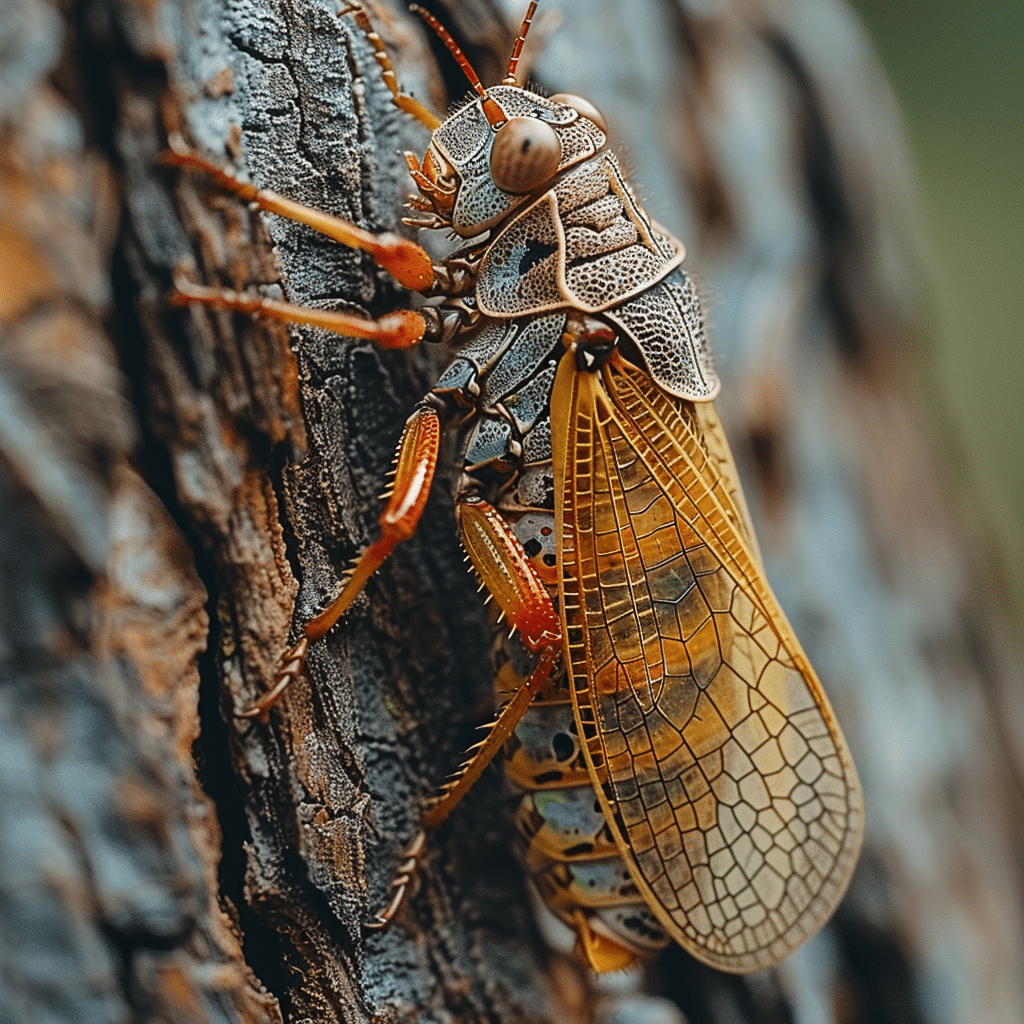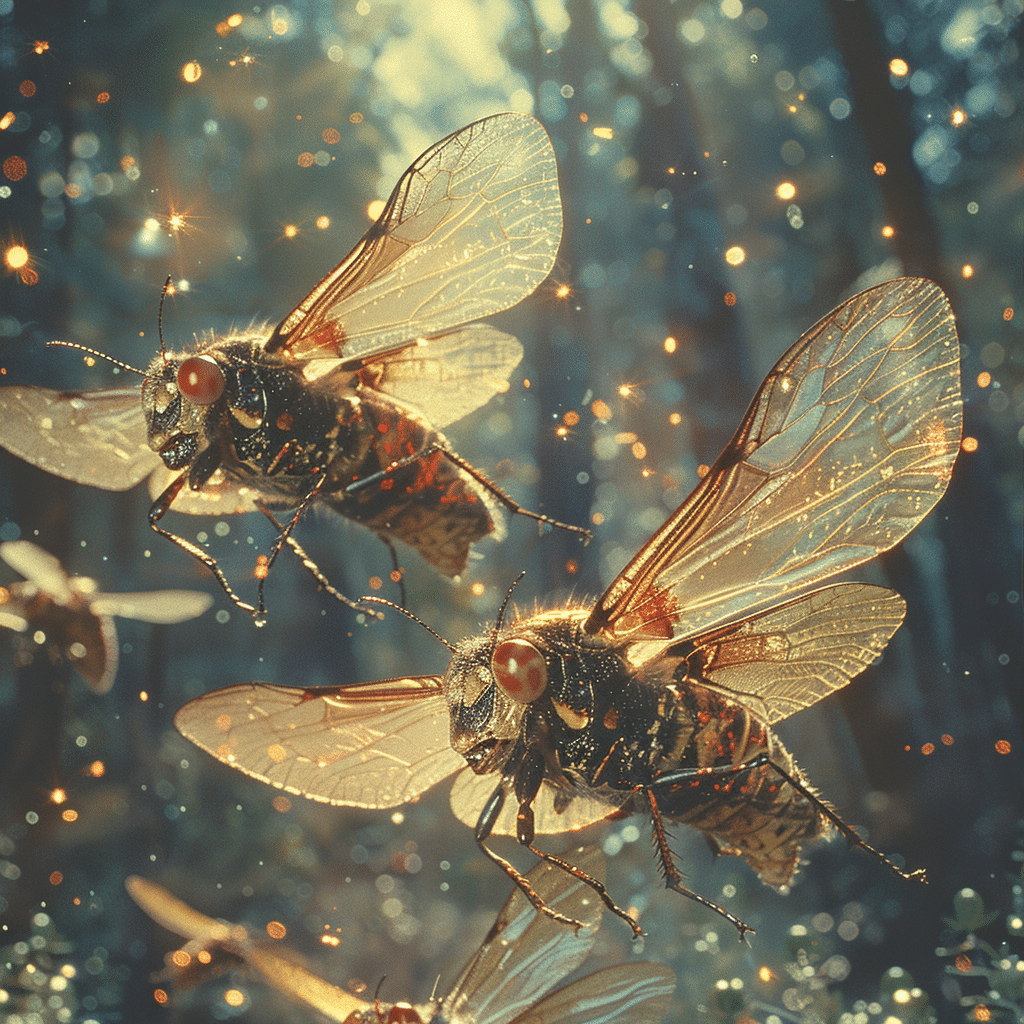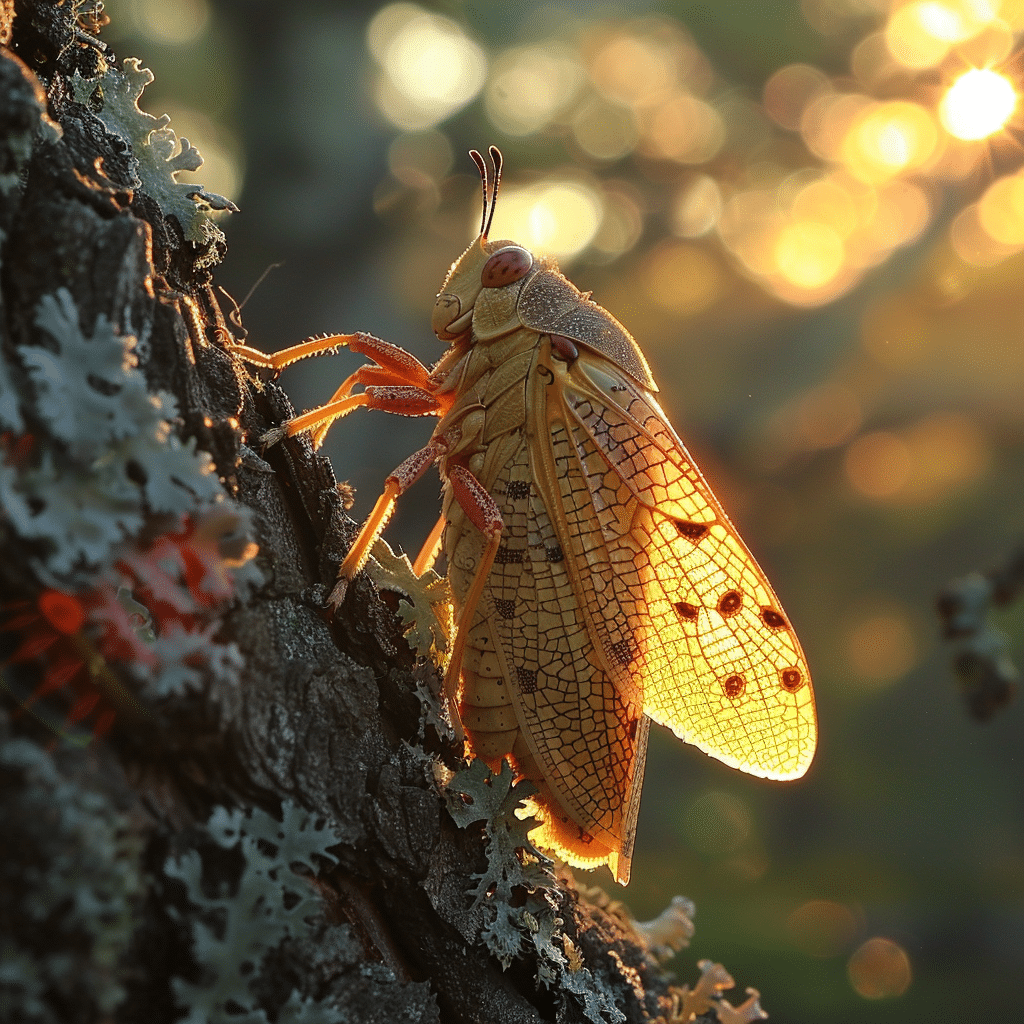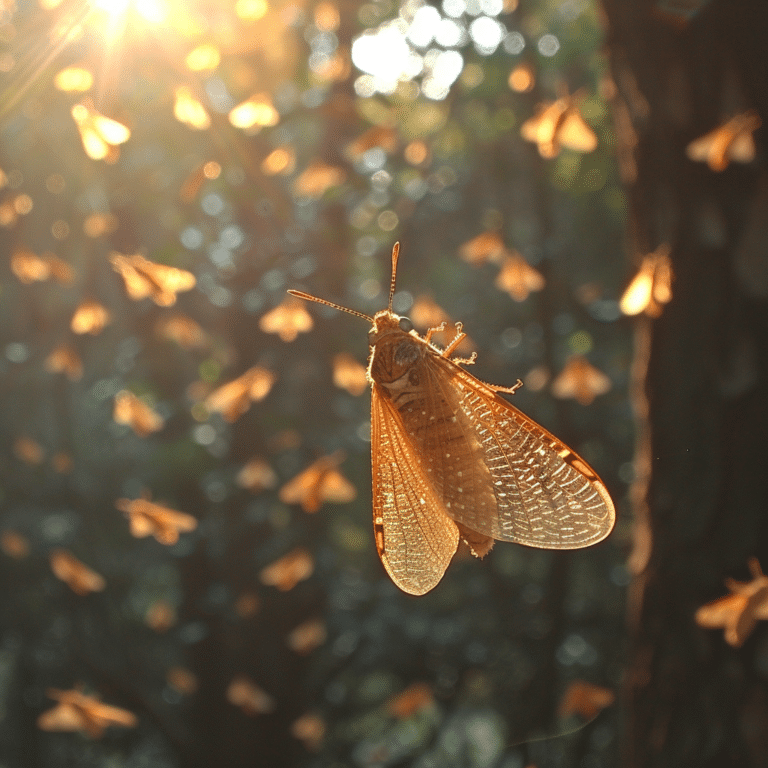Cicada season is here again. These iconic summer insects are launching their bold symphony across various regions, leaving no stone unturned with their ear-piercing mating songs. But why are cicadas so loud? Let’s delve into the mystery behind the striking cicadas sound, understanding its science, purpose, and allure.

Why Do Cicadas Sound So Loud?
Cicadas are essential to summer. Their robust calls can be heard virtually anywhere, from suburban backyards to dense forests. But why do cicadas sound so loud? The answer lies not just in their anatomy but also in their lifecycle. These insects’ decibel-shattering mating calls are more than just a summer inconvenience—they’re vital to their survival and reproduction.
The loud sounds you hear come from male cicadas looking for females to mate with, according to Arizona State University. Male abdomens are almost completely hollow, and when sound waves from tymbals enter the hollow area, they bounce around, amplifying the sound.

Understanding the Mechanics of Cicadas Sound
The Role of Tymbals
Many might wonder why a cicada’s sound is so piercing. The magic lies in the tymbals—special ribbed membranes on the male cicada’s abdomen. These tymbals rapidly contract and release, producing a clicking noise similar to a drum roll. This sound can reach up to 120 decibels, which rivals the roar of a rock concert.
Resonating Air Sacs
Beyond tymbals, cicadas employ another tactic to make their calls loud. They have hollow, air-filled cavities within their bodies that act like amplifiers. These resonating air sacs magnify the tymbal sounds, enabling the calls to travel long distances. This amplification is crucial for males to attract females from far and wide.

| Feature | Details |
| Primary Cause | The loud sounds are produced by male cicadas looking for females to mate with. |
| Sound Production Mechanism | Sound is generated by tymbals, special organs located on the first segment of the male cicada’s abdomen. |
| Amplification Mechanism | Male abdomens are almost completely hollow, allowing sound waves from the tymbals to bounce around and amplify, resulting in the characteristic loud sound. |
| Activity Period | Cicadas are primarily diurnal, with peak vocal activity during the hottest parts of the day—from late morning until late afternoon. |
| Duration of Sound | The loud noises begin about a week and a half after cicadas emerge and last for about two weeks, as the emergence period spans approximately two weeks. |
| Species Identification | Most species can be identified by their distinct songs, which help attract females and may also attract other males in species that form noisy mating aggregations. |
| Lifespan of Individuals | Individual cicadas live for only a few weeks, but the collective noise event lasts longer due to staggered emergence. |
| Timeframe Reference | Notable information provided by Arizona State University as of May 4, 2024. |
| Aspect | Details |
| Usage | |
| Sound Intensity | |
| Impact on Humans |
The Importance of Loud Cicadas Sound in Mating
Signals of Fitness
So, why do cicadas need to be so incredibly loud? The answer lies in sexual selection. Female cicadas prefer louder and more frequent calls, which are indicators of good health and vitality in males. Sound intensity serves as a proxy for genetic fitness, boosting the male’s chances of reproductive success.
Species-Specific Songs
Cicadas come with a built-in diversity when it comes to sound. Different species produce distinct calls. For instance, the Magicicada septendecim, or the 17-year cicada, is known for its repetitive, rhythmic buzzes. In contrast, the Tibicen lyricen, an annual cicada, produces a sharp, rattling buzz. These species-specific songs help females identify and choose mates from their own species, thereby avoiding hybridization.

Top 5 Most Intriguing Cicada Songs
Magicicada Septendecim: The 17-Year Brood
Tibicen Lyricen: The Annual Cicada
Green Grocer Cicada: Giant Cicada
Neotibicen Canicularis: Dog-Day Cicada
Quesada Gigas: Largest Tropical Cicada

How Cicadas Sound Impacts the Human Environment
Ecological Contributions
Though cicadas’ sound can be disruptive, it plays a vital ecological role. Their emergence significantly contributes to nutrient cycling in forests. Post-mating, the mass death of these insects leaves rich organic matter on the forest floor, benefiting a myriad of organisms.
Human Interaction and Adaptation
Residents in cicada-prone areas have learned to adapt creatively to the noise. Many turn to white noise machines or earplugs during peak periods. Despite the inconvenience, local communities often embrace cicadas as part of their natural heritage, celebrating with cicada-themed festivals like This.
The Future of Cicadas Sound in a Changing World
Climate change and urbanization pose potential threats to cicada populations. Shifts in temperature and precipitation patterns can alter their life cycles and emergence synchrony, possibly disrupting their intricate mating cacophony. Conversely, these robust insects might reveal adaptive behaviors as they adjust to new environmental norms. For more information on environmental changes, visit our gale warning meaning page.
Understanding the multifaceted nature of cicadas sound pulls back the curtain on these remarkable insects. Their powerful calls remind us of nature’s complexity and the small wonders that contribute to our world’s grand symphony. As we continue to explore and appreciate cicadas’ existence, they will undoubtedly remain one of nature’s most fascinating summer compositions.
Published by the Baltimore Examiner. Visit Decapolice for more insights into our natural and urban environments. Engage more with our content and discover features about human ingenuity in coping with cicadas as they shape our summer soundscape.
Understanding Cicadas Sound: Loud Mating Calls Explained
The Science Behind the Noise
Ever wondered why cicadas are so loud? It’s pretty fascinating! Male cicadas produce their distinctive sound using a structure called a tymbal. These are membranes that can vibrate rapidly, creating the famous cicadas sound. Suddenly, your summer nights are filled with a buzzing serenade, and it’s all in the name of love. They’re shouting out to attract females, which makes their calls an evolutionary imperative. Surprisingly, cicadas can reach volumes of up to 120 decibels, which is about as loud as a rock concert.
Unexpected Charm of Cicada Sound
But hey, don’t freak out! Cicada calls can actually enhance your summer vibe, sort of how attending a Cirque Du Soleil tysons performance transforms an evening into an unforgettable experience. Who knew these tiny creatures could become an integral part of your seasonal soundtrack? Even though their sound can sometimes feel a bit overwhelming, it’s a natural symphony that’s hard to beat.
Fun Tidbits to Chirp About
Here’s another cool tidbit: Cicadas have been around for millions of years. In fact, their species are older than many ancient trees. Interestingly, some cicadas spend up to 17 years underground before emerging. Talk about patience! Unfortunately, they don’t have the luxury of enjoying low mortgage rates to secure their homes for such prolonged periods. They simply emerge, make some noise, mate, and then their lifecycle ends soon after. Sounds like a compassionate funeral home might just be what they need.
So, the next time you hear that unmistakable cicadas sound, remember it’s all part of a grand natural spectacle. It’s more than just noise; it’s a sweet, albeit loud, symphony of life and love. Just keep this in mind before reaching for that bottle of Promethazine-dextromethorphan to cope with the nocturnal concert!

Why do cicadas suddenly make noise?
Those loud sounds you hear come from male cicadas looking for females to mate with. They’ve got these special organs called tymbals on their abdomens that make a heck of a noise when used. Their abdomens are almost hollow, so the sound waves bounce around inside, making the noise even louder.
What does it mean when cicadas make noise at night?
Cicadas are mainly active during the day, so if you’re hearing them at night, it’s probably just some background noise from a few lingering around. They’re mostly diurnal, doing their thing from late morning until the late afternoon, especially when it’s hot out.
How long do cicadas scream for?
Individual cicadas usually live for just a few weeks, but since they don’t all come out at once, the whole noisy event might seem like it’s going on forever. You’ll really start to notice the racket about a week and a half after they first show up, and it’ll last for about two more weeks.
What time of day are cicadas most active?
Cicadas are most active during the hottest parts of the day, from late morning until the late afternoon. That’s when you’ll hear them buzzing the loudest as they’re really into their mating calls during those peak heat times.
How long does the cicada season last?
The cicada season stretches out for a bit because they don’t all emerge at once. You’ll feel the full impact of their noise for about two weeks, but the whole cycle, from the first signs to the end, can last a bit longer.
Do cicadas bite or sting?
Cicadas don’t bite or sting. They’re pretty harmless to humans, even though they might look a bit scary with those big eyes and wings.
How to silence cicadas?
You can try silencing cicadas by creating barriers like netting around your trees or using a strong hose to knock them down. Unfortunately, there’s no easy way to completely shut them up since they’re pretty determined to do their thing.
What attracts cicadas to humans?
Cicadas aren’t really attracted to humans. They might land on you by accident because they’re looking for a spot to hang out, but they’re not after you specifically.
Are cicadas harmful?
Cicadas aren’t harmful to people or pets. They might nibble on tree sap, but they don’t pose any real danger. They just make a lot of noise and can be a bit of a nuisance if you’re not a fan of their singing.
What purpose do cicadas serve?
Cicadas play a role in the ecosystem by aerating the soil when they emerge and by providing food for wildlife. Their decomposing bodies also add nutrients back into the earth.
Why do cicadas only come out in summer?
Cicadas come out in the summer because they thrive in warmer temperatures. The heat helps them become more active and carry out their life cycle.
Why are the cicadas so loud this year?
Male cicadas are super loud this year because they’ve got hollow abdomens that amplify their calls. The males are all trying to attract females, so when there’s a large population, the noise can be pretty intense.
How to get rid of cicadas?
Getting rid of cicadas is tough since they’re a natural part of the environment. You can try using insect netting on plants or spraying them off with water, but there’s no foolproof way to eliminate them.
What’s the difference between a locust and a cicada?
Locusts and cicadas are often confused, but they’re different insects. Locusts are a type of grasshopper that can swarm and destroy crops, while cicadas are known for their loud mating calls and don’t cause significant agricultural damage.
Why do cicadas never stop making noise?
Cicadas keep making noise to attract mates. The males will sing their heart out trying to catch the attention of females and sometimes to call other males to form noisy groups.
Why are the cicadas so loud this year?
Cicadas sing loudly when it’s hot because the heat energizes them and makes their muscles work more efficiently, boosting their singing efforts to attract mates.
Why do cicadas sing when it’s hot?
When cicadas come out, they shed their old skins, mate, lay eggs, and then die after a few weeks. It’s a short but very noticeable cycle because of all the noise and activity they generate.
What happens when cicadas come out?
To get rid of noisy cicadas, you could use measures like insect netting or hosing them down from trees and plants. Unfortunately, complete silence is hard to achieve due to their persistent nature and numbers.



























